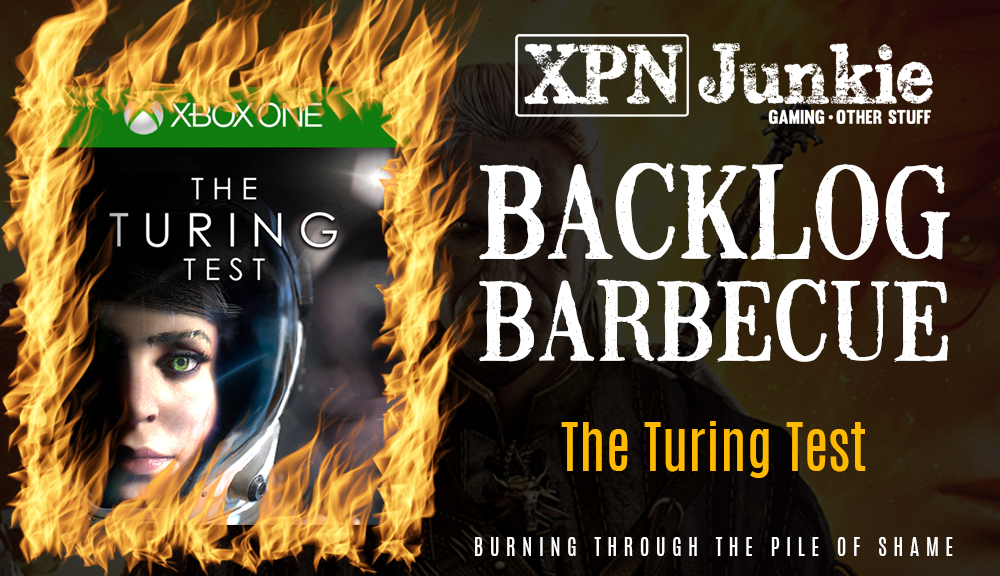Well look at that! No less than a few hours after I posted the Backlog Barbecue Cookout Edition image, I already have my first log on the fire. The Turing Test, a first person puzzle game, was something I’d been playing off and on for a few weeks now. The game is largely broken up in to “puzzle rooms” (think Portal) and it saves after the completion of each room, so it was easy to hop on and do a few before bouncing off and taking care of other stuff.
The central narrative that drives the player to begin working their way through room after room consists of a team of scientists that have gone dark on a planet they were conducting experiments on. You play as a character named Ava Turing that is awoken from cryosleep and charged with fixing something and finding the missing scientists. You are aided by a central computer A.I. that speaks to you through your communication device, asking questions about morality and creativity, etc. Basically, the things we think and feel that makes us “alive.”
This narrative is all well and good, but if you’ve played Pneuma: Breath of Life, the other puzzle game produced by Bulkhead Interactive, you’ll see a common theme that revolves around free will and the idea that just maybe the character is not responsible for their actions, as if they’re being controlled by someone else.
Thankfully, they’ve reeled in the dialogue for The Turing Test. The conversations between Ava and T.O.M. (the A.I.) usually happen as you enter a room and only last for a minute or so. This is a great change from Pneuma, which had the character talking to himself practically non-stop in what was probably one of the most irritating voice-overs in recent memory. I remember playing the game with subtitles on and the television muted. It was that bad.
The Turing Test is noticeably longer than its predecessor though, and I believe I counted the number of rooms at about 70, each broken up into chapters for every ten rooms. Each chapter also has an optional challenge room that provides some extra context and backstory. It doesn’t hold your hand either. The game actually provides very little context or help into just what exactly you’re supposed to do in each room. The puzzles can range from stupidly simple to downright baffling. A few times I spent a pretty good chunk of time just wandering around the room looking for some clue as to what I was expected to do. Eventually, either through the process of elimination or just sheer desperation, I’d try some off-the-wall strategy and it would work. The game is very intent on getting you to think “outside the box.” This isn’t by accident, as there is a purpose to the creativity needed to think your way to the exit. They will tell you absolutely nothing, even when it comes to those optional areas. I actually passed up the first few, not really realizing what they were until after I had already moved on to the next room. Maybe I’ll go back and do them to get the 1000g. Or maybe not, I have a lot of other shit to get through.

If there’s one thing that really bugged me about the game, and it’s not even really limited to this particular one, but it seems like all of these puzzle games find one mechanic and milk the hell out of it for the entire game. Sure, they’ll throw an extra kink in here or there to keep it interesting, but for the most part you’re really only doing the same thing, over and over. Portal was fresh, at the time, and it was short enough to keep from getting stale (not to mention the famous twist). But after that we’d seen it. Portal 2, despite how solid and brilliant it was, suffered from the puzzle fatigue after a while. Pneuma with its look-at-it-now-don’t-look-at-it puzzle mechanic got old as well. The laser beams in The Talos Principle were driving me fucking mad by the time I finished that game. In The Turing Test, the mechanic came in the form of energy orbs that needed to be placed in specific power modules in order to open doors, power bridges, move platforms, etc. It’s a good, solid mechanic for sure, but by the time you’re hitting room #40, it’s starting to wear pretty thin.
I miss the puzzle games that consisted of unique puzzles. Old point-and-click PC games like The 7th Guest, Phantasmagoria, and Myst (along with its many clones) consisted of organic puzzles and devious mini-games, like arranging chess pieces to clear the board in a certain number of moves, or memorizing a pattern and repeating it. Were they the most complex of puzzles? Of course not, but look at the hardware they were working with. In this day and age, why can’t we get a puzzle game that has puzzles that actually change?
This is more of a complaint with the genre than The Turing Test itself. That said, the game was solid and intriguing. The argument for thought and free will with either interest you or it won’t. I know it’s meant to invoke thought, but I was already hurting my brain enough on some of the game’s rather obtuse puzzles too often to care what they were talking about.
There was a slight twist at the end, and if you plan on playing this game, I’ll give you some advice; Don’t hesitate to do what you gotta do.
I didn’t.





